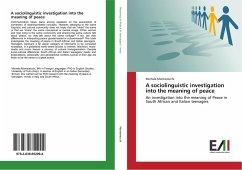
A sociolinguistic investigation into the meaning of peace
An investigation into the meaning of Peace in South African and Italian teenagers
Versandkostenfrei!
Versandfertig in 6-10 Tagen
49,99 €
inkl. MwSt.

PAYBACK Punkte
25 °P sammeln!
Communication takes place among speakers on the assumption of sameness of meaning-related concepts. However, belonging to the same linguistic and cultural community does not imply that we mean the same or that we share the same conceptual or mental image. When women and men living in the same community and sharing the same culture talk about peace, do they talk about the same concept? If not, are their differences in interpreting peace gender-based or culture-based? This book investigates the meaning of peace in South African and Italian teenagers. Teenagers represent a far easier category of ...
Communication takes place among speakers on the assumption of sameness of meaning-related concepts. However, belonging to the same linguistic and cultural community does not imply that we mean the same or that we share the same conceptual or mental image. When women and men living in the same community and sharing the same culture talk about peace, do they talk about the same concept? If not, are their differences in interpreting peace gender-based or culture-based? This book investigates the meaning of peace in South African and Italian teenagers. Teenagers represent a far easier category of informants to be compared nowadays, in a globalised world where access to internet, television, mass-media and music favours a process of cultural homogenisation. Despite socio-cultural differences South African and Italian teenagers needs and expectations, personality and generational conflicts typical of their age are likely to be the same to a great extent.







![Tolstoi, A Man Of Peace [and] The New Spirit Cover Tolstoi, A Man Of Peace [and] The New Spirit](https://bilder.buecher.de/produkte/68/68940/68940784n.jpg)




